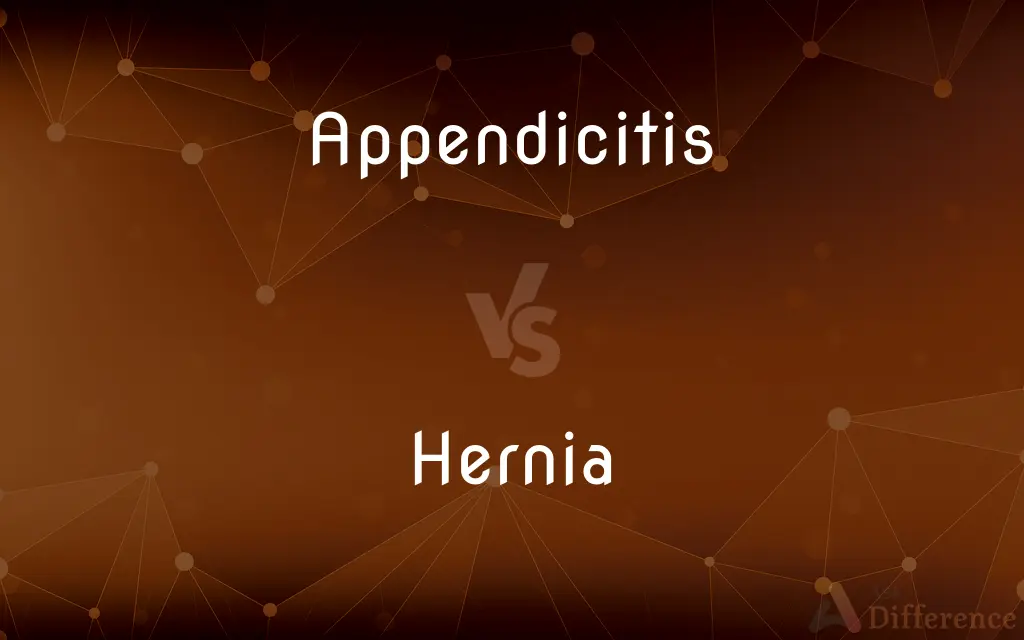Appendicitis vs. Hernia — What's the Difference?
By Fiza Rafique & Urooj Arif — Updated on March 26, 2024
Appendicitis involves inflammation of the appendix, typically requiring surgery, while hernias involve organs protruding through weakened muscles, often treatable with or without surgery.

Difference Between Appendicitis and Hernia
Table of Contents
ADVERTISEMENT
Key Differences
Appendicitis is characterized by the inflammation of the appendix, a small pouch connected to the large intestine, which can cause severe abdominal pain and often requires surgical removal. On the other hand, a hernia occurs when an organ or fatty tissue squeezes through a weak spot in a surrounding muscle or connective tissue called fascia. The most common types of hernias are found in the abdominal area.
While appendicitis symptoms usually include sudden abdominal pain that begins on the right side of the lower abdomen, nausea, and vomiting, hernia symptoms can vary depending on the type but often involve a noticeable bulge in the abdomen or groin, pain, and discomfort, especially when bending over, coughing, or lifting.
The cause of appendicitis is often the blockage of the appendix by feces, a foreign object, or, in rare cases, a tumor, leading to infection. In contrast, hernias can be caused by a combination of muscle weakness and strain. Factors that can cause muscle weakness include age, chronic coughing, and previous surgeries in the area, while strain can occur from lifting heavy weights, constipation, or during pregnancy.
Diagnosis of appendicitis typically involves physical examinations, blood tests to check for infection, and imaging tests like an ultrasound or CT scan. Hernias, however, can often be diagnosed through a physical exam, with imaging tests used to confirm the diagnosis or plan for surgery.
Treatment for appendicitis is usually surgical removal of the appendix, known as an appendectomy. Hernias may require surgery to repair the hole in the muscle wall, but some small hernias can be managed with watchful waiting or lifestyle changes.
ADVERTISEMENT
Comparison Chart
Definition
Inflammation of the appendix, often requiring surgery.
Protrusion of an organ through weakened muscles.
Symptoms
Sudden abdominal pain, nausea, vomiting.
Bulge in abdomen/groin, discomfort when active.
Causes
Blockage of appendix leading to infection.
Muscle weakness and strain.
Diagnosis
Physical exam, blood tests, imaging (ultrasound, CT scan).
Physical exam, sometimes imaging tests.
Treatment
Appendectomy (surgical removal of the appendix).
Surgery or watchful waiting depending on severity.
Compare with Definitions
Appendicitis
Often caused by a blockage inside the appendix, leading to infection.
Appendicitis in his case was triggered by a blockage in the appendix.
Hernia
Caused by a combination of muscle weakness and strain.
The hernia was the result of muscle weakness and repetitive strain.
Appendicitis
Inflammation of the appendix, a small tube attached to the large intestine.
The sudden, severe abdominal pain was diagnosed as appendicitis.
Hernia
A condition where an organ pushes through an opening in the muscle or tissue that holds it in place.
His heavy lifting at work led to the development of a hernia.
Appendicitis
Usually treated with surgery to remove the appendix.
He underwent an emergency appendectomy to treat his appendicitis.
Hernia
Treatment can include surgery or watchful waiting, based on severity.
After evaluating his hernia, the doctor recommended surgery.
Appendicitis
Severe abdominal pain starting on the right side, nausea, and fever.
She was rushed to the hospital with classic signs of appendicitis.
Hernia
A noticeable bulge, pain, and discomfort in the affected area.
The hernia caused a visible bulge in her abdomen.
Appendicitis
Diagnosed through physical examination, blood tests, and imaging techniques.
The diagnosis of appendicitis was confirmed after a CT scan.
Hernia
Often diagnosed via physical exam, with imaging tests for confirmation.
The physical examination revealed a hernia, later confirmed by an ultrasound.
Appendicitis
Appendicitis is inflammation of the appendix. Symptoms commonly include right lower abdominal pain, nausea, vomiting, and decreased appetite.
Hernia
A hernia is the abnormal exit of tissue or an organ, such as the bowel, through the wall of the cavity in which it normally resides. Hernias come in a number of types.
Appendicitis
Inflammation of the vermiform appendix.
Hernia
The protrusion of an organ or other bodily structure through the wall that normally contains it; a rupture.
Appendicitis
(pathology) inflammation of the vermiform appendix
Hernia
(diseases) A disorder in which a part of the body protrudes abnormally through a tear or opening in an adjacent part, especially of the abdomen.
Appendicitis
Inflammation of the vermiform appendix.
Hernia
A protrusion, consisting of an organ or part which has escaped from its natural cavity, and projects through some natural or accidental opening in the walls of the latter; as, hernia of the brain, of the lung, or of the bowels. Hernia of the abdominal viscera in most common. Called also rupture.
Appendicitis
Inflammation of the vermiform appendix
Hernia
Rupture in smooth muscle tissue through which a bodily structure protrudes
Common Curiosities
What is a hernia?
A hernia occurs when an organ pushes through an opening in the muscle or tissue that holds it.
What causes a hernia?
Hernias are caused by muscle weakness and strain.
How is appendicitis treated?
Treatment typically involves surgical removal of the appendix.
What are the symptoms of appendicitis?
Symptoms include sudden abdominal pain, nausea, and vomiting.
What happens if appendicitis is not treated?
Untreated appendicitis can lead to the appendix bursting, causing a serious infection.
What causes appendicitis?
It's usually caused by a blockage inside the appendix, leading to infection.
How is a hernia diagnosed?
Hernias are often diagnosed through a physical exam, with imaging tests for confirmation.
What is appendicitis?
Appendicitis is the inflammation of the appendix, often requiring surgical removal.
Can hernias recur after surgery?
Yes, hernias can recur, especially if the underlying causes like muscle weakness are not addressed.
Can hernias be treated without surgery?
Some small hernias can be managed with watchful waiting or lifestyle changes.
What are the symptoms of a hernia?
Symptoms can include a bulge in the abdomen or groin and discomfort.
Can appendicitis be prevented?
There's no sure way to prevent appendicitis, but a diet high in fiber might reduce the risk.
How long is recovery after hernia surgery?
Recovery can vary, but most people can resume normal activities within a few weeks.
Can children get hernias?
Yes, children can develop hernias, often congenital or due to muscle weakness.
Is appendicitis more common in a certain age group?
Appendicitis is most common in people between the ages of 10 and 30.
Share Your Discovery

Previous Comparison
Foot vs. Sole
Next Comparison
Accessible vs. ReachableAuthor Spotlight
Written by
Fiza RafiqueFiza Rafique is a skilled content writer at AskDifference.com, where she meticulously refines and enhances written pieces. Drawing from her vast editorial expertise, Fiza ensures clarity, accuracy, and precision in every article. Passionate about language, she continually seeks to elevate the quality of content for readers worldwide.
Co-written by
Urooj ArifUrooj is a skilled content writer at Ask Difference, known for her exceptional ability to simplify complex topics into engaging and informative content. With a passion for research and a flair for clear, concise writing, she consistently delivers articles that resonate with our diverse audience.














































